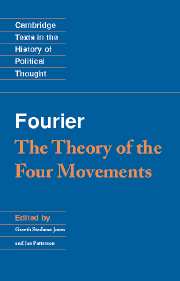Book contents
- Frontmatter
- Contents
- Introduction
- Principal events in Fourier's life
- A brief note on further reading (in English)
- Translator's introduction
- The Theory of the Four Movements and of the General Destinies
- 1808 Introduction
- Preliminary discourse
- Plan
- First part: Exposition of some branches of the general destinies
- Second part: Description of the various branches of the private or domestic destinies
- First account: On the progressive household of the seventh period, and on the discontents of the sexes in the incoherent household
- Second account: On the splendour of the combined order
- Third part: Confirmation derived from the inadequacy of the inexact sciences to deal with all the problems that the civilised mechanism presents
- Omitted chapter
- Note A
- Advice to the civilised
- 1818 Introduction
- Index
- Cambridge Texts in the History of Political Thought
First account: On the progressive household of the seventh period, and on the discontents of the sexes in the incoherent household
Published online by Cambridge University Press: 05 June 2012
- Frontmatter
- Contents
- Introduction
- Principal events in Fourier's life
- A brief note on further reading (in English)
- Translator's introduction
- The Theory of the Four Movements and of the General Destinies
- 1808 Introduction
- Preliminary discourse
- Plan
- First part: Exposition of some branches of the general destinies
- Second part: Description of the various branches of the private or domestic destinies
- First account: On the progressive household of the seventh period, and on the discontents of the sexes in the incoherent household
- Second account: On the splendour of the combined order
- Third part: Confirmation derived from the inadequacy of the inexact sciences to deal with all the problems that the civilised mechanism presents
- Omitted chapter
- Note A
- Advice to the civilised
- 1818 Introduction
- Index
- Cambridge Texts in the History of Political Thought
Summary
The progressive household I am going to describe is a domestic order belonging to the seventh and twenty-sixth periods, occupying a position midway between the incoherent household of barbarism and Civilisation and the combined household which reigns during the eighteen periods of universal harmony.
In the progressive household, men [and women] enjoy such an agreeable and comfortable existence that it would be impossible to persuade any of them to embark on the kind of permanent marriage which isolated households require.
Before speaking of the customs which arise as a result of the absence of marriage, I shall examine the reasons for civilised man's blind prejudice in favour of permanent marriage.
It must be remembered that I admit the necessity of this bond in Civilisation and that I am criticising it by comparison with the new social order, in which different circumstances will call for a freedom in love which is inadmissible in our society. It must also be remembered that on matters of marriage, household life and other questions you should assume an exception of one-eighth from my general assertions.
Order of matters dealt with in the First Account
On the discontents of men in incoherent households.
On the progressive household or nine-group tribe.
On the method of union of the sexes in the seventh period.
On the degradation of women in Civilisation.
On the correctives which will have led into the sixth period, such as the amorous majority, the amorous corporations, etc.
On the vices of the system which oppresses love.
- Type
- Chapter
- Information
- Fourier: 'The Theory of the Four Movements' , pp. 109 - 150Publisher: Cambridge University PressPrint publication year: 1996



